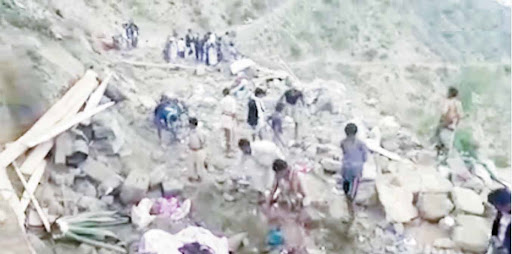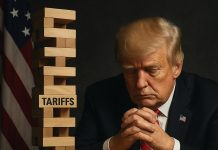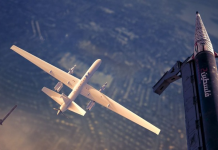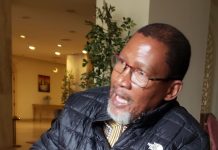Sky News investigation has discovered evidence of a recent potential war crime in northern Yemen by the Saudi-led coalition, which is backed by the US and Britain.
There’s already growing controversy over why Britain is still supporting a campaign which has led to the country being declared the world’s biggest humanitarian disaster.
The Sky team travelled hundreds of kilometres along dry riverbeds and through rocky, inhospitable terrain and winding mountain paths to reach the remote village of Washah near the Yemeni-Saudi border. Once there, we were led by foot up narrow hill trails to the site of an airstrike on a family home.
We were the first outsiders to reach the site – and the first independent journalists to examine the area and talk to multiple eyewitnesses as well as survivors of the massacre.
The mud and stone home was now rubble. There was very little left of it. But it was still strewn with personal items from the Mujali family who once lived there.
We saw a broken solar panel, a TV satellite dish twisted by the blast, and a metal cooking dish amongst the debris.
There was a dusty baby’s bib and small trousers for a toddler.
The crowd of neighbours who gathered round us were angry as well as shocked.
“Body parts landed on my roof,” one older man told us. “I live up the hill there,” he said, pointing. “I’d never seen anything like it.”
Others pointed down the valley: “A leg ended up there. And an arm there.”
This was a massacre. Nine people died on that day. Six of them were children.
There were no adult men amongst the dead or injured. There were only three survivors – a young mother who was breastfeeding her baby son and a teenage boy.
We tracked down all three survivors, who are now hundreds of kilometres away from Washah.
They told us the family had been gathering in the house for their midday meal. It was around 1pm on Sunday 12 July when the attack happened.
“I was screaming for help,” Nora Ali Muse’ad Mujali said.
She’d been breastfeeding her baby boy in the corner of the house when the bomb landed.
“I was in shock. The house was destroyed,” she said.
“I was searching for my daughter (who had been just next to her). But she was dead. Then I saw my sister-in-law and she was dead too. I just picked up my son and screamed for help.”
One of the family relatives, who was further up the hill at the time, told us he heard a jet circling above and then a loud noise as the bomb was unleashed and hit the house. No other home in the area was touched.
“They were just women and children,” he said.
He and others raced to the scene. “The jet kept circling for another 15 minutes,” he told us. “It was terrifying.”
Deliberate targeting of civilian and non-military sites may be considered a war crime under international law.
They believed there could be another attack imminently. He saw his young cousin buried under debris and the boy looked badly burned.
A door had landed on top of him, but it helped shield him from the falling rubble. Neighbours loaded him into a vehicle to transport him on the difficult and long journey to a hospital in Sana’a.
Many of his other relatives in the house at the time were killed outright, and were unrecognisable.
“We only realised it was his mother by her torso,” his cousin said. “We gathered their body parts in plastic bags for burial.”
The neighbours and relatives took photographs on their phones of the dead children, wrapped in bloodied shawls. But they also photographed fragments of the bomb and some of the shrapnel appeared to have identifying marks on them.
Weapons experts we consulted told us the fragments found seem to be part of a GBU-12, 500lb fin-guided bomb, manufactured in America and commonly used in the five-year long coalition bombing campaign in Yemen.
Human rights investigators who’re building up a dossier of potential war crimes told us they are determined to find justice for the civilians caught in the middle of this conflict.
They have got details of at least 500 attacks by the coalition where civilians have been the victims. Amongst them are five different attacks which they say they’ve linked to the British authorities or British companies.
Ali Jameel, a researcher for Mwatana For Human Rights, said: “People who are in authority in the UK and could have stopped this from happening and didn’t, should take their responsibility and they should stand in front of a court, right next to the victims who were injured or killed.”
A UK government spokesperson said: “The UK is deeply concerned by the ongoing conflict and humanitarian crisis in Yemen. We fully support the peace process led by the UN Special Envoy, Martin Griffiths, and urge the parties to engage constructively with this process.
“The government takes its export responsibilities seriously and assesses all export licences in accordance with strict licensing criteria. We will not issue any export licences where to do so would be inconsistent with these criteria.”





















